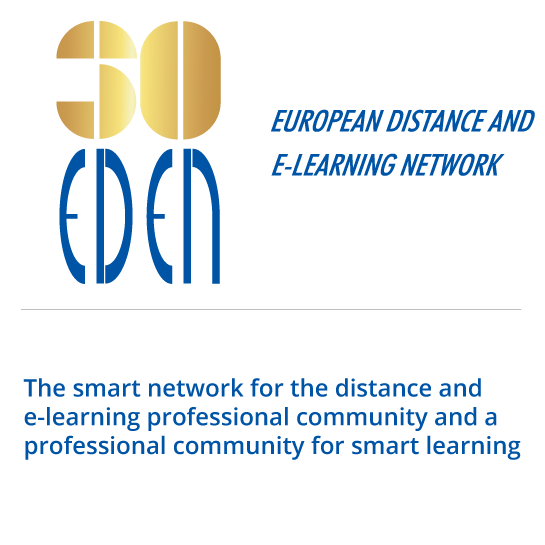Dear Colleagues,
With less than a month ahead, please be kindly reminded that the registration for the EDEN Annual Virtual Conference on 22-24 June is already open, you can sign up by clicking HERE.
The conference will be hosted by the Politehnica University, Timisoara, Romania. Call for Contributions remains open throughout May. You are welcomed at the acclaimed, traditional sections at the Conference such as Plenary sessions, Oxford debate, Workshops, Posters, Demonstrations, the Synergy brainstorming and the PhD Symposium. Hereby we would like to call your attention to one of the highlights of the series of events: the MicroHE Conference.
MicroHE Final Conference

MicroHE was built on the conviction that micro-credentialing in Higher Education can be the key to the successful transformation of universities’ service offering, attracting more learners and providing them with high quality micro-credentials that are portable, modular and stackable.
The project has already produced highly influential outputs such as the MicroHE meta-data standard, that has become an important building block of the new Europass data model, the first European issuer of blockchain-secured stackable ECTS credentials, and an ‘invitation only’ Digital Credentials Masterclass, where a selected groups of experts analysed and discussed the future development of micro-credentialing in the coming 5 to 10 years.
We are in the process of conducting a Delphi survey to forecast the impacts of continued modularisation of Higher Education on HE Institutions and examining the adequacy of European recognition instruments for micro-credentials, in particular ECTS, the diploma supplement and qualification frameworks.
While the project partnership is busy completing their mission, the overall European Policy Landscape is rapidly changing as well, echoing the MicroHE sentiments and calls for action. The new Europass, the European Commission’s recently assembled Micro-Credentials Consultation Group and the MICROBOL (Micro-credentials linked to the Bologna key commitments) project are exemplary initiatives that speak for themselves.

The event embedded in the EDEN 2020 Annual Virtual Conference will start with the MicroHE conference keynote address of
Anthony Camilleri:
Micro-Credentials in the Future European Policy Landscape.
After the plenary session the MicroHE strand will be continued in workshop form in 3 Sessions:
Session A: Impact of micro-credentials on new learner paradigms
Are you prepared for the new world of microcredentials and digital credentials? HEIs are increasingly confronted with requests from learners to recognize outside learning such as MOOCs as credit towards a degree. For those, students look for the most prestigious and up to date learning opportunities, which they often find online. Recognition of micro-credentials can enhance student motivation, responsibility and determination, enabling more effective learning. Digital credentials have the potential to scale and speed up recognition processes in Higher Education. There will not be one single best solutionIn this session, we will put the learner in the center of our considerations.
Session B: Technology powering the future of micro-credentials
Procedures for recognition of prior learning do not scale to the massive numbers of students enrolling in open education programmes (MOOCs). Many open educational providers are creating parallel systems of credentials – leading to a situation where millions of students are enrolling in open courses offered by universities, which do not award recognised forms of credit. A harmonised European approach to recognizing and transferring open education digital credentials would enable virtual student mobility, empowering students to adapt their learning portfolio to changing labour market demands and new technological trends.
An interoperable, validated and widely acknowledged meta-data standard, testing and using the clearinghouse, powered by the blockchain technologies, may pave the way for a solid cosntellation that can satisfy the micro-credentials market.
In order to achieve maximum interoperability, the MicroHE project chose ESCO as default ontology, identifying these categories as relevant for the EU labour market and education and training, showing the relationships between different concepts of ontology to be used by computer systems across Europe.
Session C: Impacts of Micro-Credentials on Institutional Processes
Microcredentials represent an alternative approach towards handling the development needs of the modern-day learner, not only helping individual competence development but also offer increased flexibility and personalization. Digitalisation, although so far mainly appeared as an opportunity, until very recently the COVID crisis turned it into a necessity overnight
The use and implementation of approaches such as Microcredentials, require a well envisioned structured approach comprising of different stages and layers of technical infrastructure as well as a proactive approach. Their impact has been identified as key in offering the possibility to enhance and strengthen inter-institutional processes and also making them attractive to lifelong learners.
The MicroHE Day, as well as all sessions of the EDEN 2020 Annual Conference – albeit on a bit less traditional, fully virtual platform – are highly anticipated by the EDEN community to be a memorable professional and networking event.
We look forward to your attendance!


